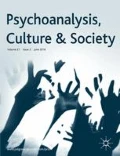Abstract
Guillermo del Toro's film, Pan's Labyrinth, employs a common childhood fantasy, described by Freud in “Family Romances” as a matrix for the narrative of a young girl's development into an ethical subject of social community. Surreal scenes represent the child's encounters with drive jouissance, issuing in a recognition of shame and a consequent relation to history. Recalling an image of a resistance against Spanish Fascism, the film enacts a collective family romance as a messianic project that proposes a genealogy for a potential future.
Similar content being viewed by others
Notes
In the director's commentary on the DVD (distributed by Picturehouse, 2007), del Toro emphasizes that he uses music, voiceover, and sound effects throughout the film to immerse the audience in an environment of surround-sound. References to del Toro throughout are from the director's commentary.
Personal communication, 14 January 2007. I am indebted to Manya's generosity in conversations about the film and for her reading of an earlier version of this paper.
The implications of Copjec's powerful argument in “The Object-Gaze: Shame, Hejab, Cinema” answer to a continuing difficulty on the part of psychoanalytic theory to describe and account for social and political phenomena. The social symbolic, Moustafa Safouan insists again and again, is not 1+1+1 …; the processes of the individual unconscious cannot be drafted onto the social symbolic. The subject is asymmetrical to political institutions and processes and to the movement of history. What is especially valuable in Copjec's theorization is her description of jouissance as potential and of that potential as a link to a social inheritance. Lacan theorizes the gaze in Seminar XI (1981), lessons 6–9, and the drive in lessons 10–15. Seminar X (2004) fully develops the objet a and anxiety. See also the conclusion to Benvenuto, 1994, Part IV, pp 129–146, for an original discussion of shame. For a review of recent research into the psychology of shame, see Ruth Leys (2007).
The Nationalist victory allowed Franco's regime to rewrite and suppress the history of the Civil War. In Paloma Aguilar's account, “Generally, the Civil War was not referred to as such, but was nearly always called the ‘Crusade’ or the ‘War of Liberation’ or the ‘Glorious Uprising,’ deceiving the [young] about the fratricidal nature of the war” (2002, p 61). Textbooks, movies, and monuments were instrumental means of perpetuating the state's version of history. Even during the transition to democratic rule after Franco's death in a revived monarchical regime under King Juan Carlos I that held free elections in 1979, memories of the Civil War remained buried, and those responsible for atrocities were amnestied; quoting from a contemporary news article, Aguilar explains, “It was the view of many that ‘democratic Spain must from now on look to the future, forget the events and responsibilities of the Civil War and distance itself from forty years of dictatorship … . A people cannot and must not lack historical memory: but the latter must serve to encourage projects for peaceful future coexistence rather than promote rancour about the past’” (2001, p 102). Neglect of the past, uninterrupted by token acknowledgments and infrequent prosecutions of past injustices, for the sake of “national reconciliation,” stability, and “progress”, commonly follows from the regime changes, democratic transitions, and truth commissions of the twentieth century; for the paradigmatic cases of Chile, see Loveman and Lira (2007), and of Guatemala, see Oglesby (2007).
References
Aguilar, P. (2001). Justice, Politics and Memory in the Spanish Transition. In Barahona de Brito, A., Gonzaléz-Enríquez, C. and Aguilar, P. (eds.) The Politics of Memory: Transitional Justice in Democratizing Societies. Oxford: Oxford University Press, pp. 92–118.
Aguilar, P. (2002). Memory and Amnesia: The Role of the Spanish Civil War in the Transition to Democracy, Oakley, M. (trans.) New York and Oxford: Berghahn Books.
Benjamin, W. (2003). On the Concept of History. In Eiland, H. and Jennings, M.W. (eds.), Zohn, H. (trans.) Selected Writings. Cambridge and London: Harvard University Press, pp. 389–400.
Benvenuto, B. (1994). Concerning the Rites of Psychoanalysis. New York: Routledge.
Copjec, J. (2006). The Object-Gaze: Shame, Hejab, Cinema, presented at a symposium “Unveiled: Shame, Identity, Gender and Iranian Cinema,” as part of the program Out of the Tower, Off the Couch, sponsored by the Northern California Society for Psychoanalytic Psychology, Berkeley, California, 28 October.
Del Toro, G. (dir., 2007). Pan's Labyrinth (El Laberinto del Fauno, 2006, Mexico). Picturehouse.
Freud, S. (1959; orig. 1909). Family Romances. In Strachey, J. (ed. and trans.) The Standard Edition of the Complete Psychological Works of Sigmund Freud, Vol. 9. London: The Hogarth Press, pp. 237–241.
Lacan, J. (1981). The Four Fundamental Concepts of Psychoanalysis (J.-A. Miller, ed. and Sheridan, A. trans.) New York: W. W. Norton.
Lacan, J. (2004). Le Séminaire, livre X. Paris: Seuil.
Leys, R. (2007). From Guilt to Shame: Auschwitz and After. Princeton: Princeton University Press.
Loveman, B. and Lira, E. (2007). Truth, Justice, Reconciliation, and Impunity as Historical Themes: Chile, 1814–2006. Radical History Review 97, pp. 43–76.
Oglesby, E. (2007). Educating Citizens in Postwar Guatemala: Historical Memory, Genocide, and the Culture of Peace. Radical History Review 97, pp. 77–98.
Author information
Authors and Affiliations
Corresponding author
Rights and permissions
About this article
Cite this article
Thormann, J. Other Pasts: Family Romances of Pan's Labyrinth. Psychoanal Cult Soc 13, 175–187 (2008). https://doi.org/10.1057/pcs.2008.9
Published:
Issue Date:
DOI: https://doi.org/10.1057/pcs.2008.9




